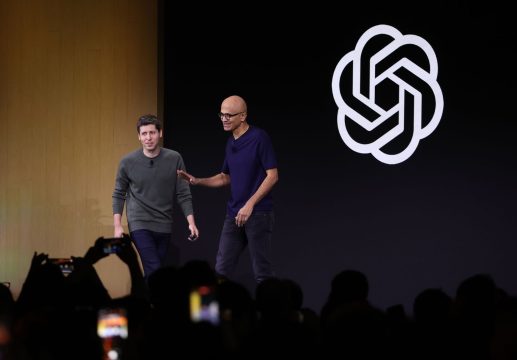This is not investment advice. The author has no position in any of the stocks mentioned. Wccftech.com has a disclosure and ethics policy.
Microsoft Corporation's partnership with OpenAI is facing some interesting times as we exit 2023. OpenAI, led by its founder Sam Altman, was under intense media scrutiny in November after a sudden board coup ousted its CEO Sam Altman and head of research, only to see them return within days and replace the board with new members. The entire affair raised questions about the stability of OpenAI, widely thought to be the world's premier artificial intelligence company.
However, it now appears that troubles at the firm might be far from over, as a report from Bloomberg shares that the Federal Trade Commission (FTC) is asking questions about Microsoft's OpenAI investment to see if any antitrust laws are violated.
U.S. FTC Seeking Details About Microsoft's OpenAI Investment Says Report After U.K.'s CMA Opens Up For Comments
Bloomberg's report follows an official statement from the U.K.'s Competition and Markets Agency (CMA) that sought views on Microsoft's partnership with OpenAI. This process comes before the CMA officially opens an investigation, and its comment period ends on January 3rd. Through this, it aims to determine whether Microsoft's OpenAI partnership can be investigated for creating unfavorable and anticompetitive effects. Microsoft is no stranger to the CMA, as its multi billion dollar acquisition of Activision spent quite some time at the desks of the British agency.
While the CMA has officially opened up for comments, the FTC's investigation is being reported by Bloomberg's sources. A formal FTC investigation is not underway as of yet, and according to the sources, the agency is "examining" the nature of Microsoft's investments to see whether the deal hampers open market competition.
The source adds that Microsoft had not reported its investment to the FTC as it did not acquire a controlling stake in OpenAI under U.S. laws. The matter is further complicated by OpenAI being a non profit, which removes the requirement for acquirers to report any deals.

OpenAI and Microsoft CEOs Sam Altman and Satya Nadella / Image Credits - Justin Sullivan / Getty Images
The potential for OpenAI to fundamentally transform Microsoft - a firm with which it has been closely associated for years is immense. While Microsoft started out as a software company that sold operating systems, it is now one of the world's leading cloud computing platform providers. Its Azure platform is widely used, and with the near ubiquitous potential offered by OpenAI's A.I. models, Azure will undoubtedly seek to leverage as much of OpenAI's technology as it can.
The CMA's decision to open comments on Microsoft's OpenAI investment also carries the risk of similar moves by other agencies, such as those of the European Union or China. 2023's close has seen nearly all big ticket tech names, such as Microsoft, Amazon and Google showcase their own A.I. platforms. Amazon acquired the OpenAI spin off Anthropic earlier this year, while Google's A.I. research division DeepMind was the primary reason behind OpenAI's creation.
While OpenAI's holding company is still a nonprofit, the spectacular success of ChatGPT has thrown its board and CEO in a spin. The potential for ChatGPT and A.I. in general to transform industries ranging from logistics to healthcare and finance creates the potential for a multi billion dollar revenue pie and fierce corporate competition - two things that are incompatible with a non profit business model. An FTC spokesperson declined Bloomberg's request for comment, while Microsoft did not respond.













